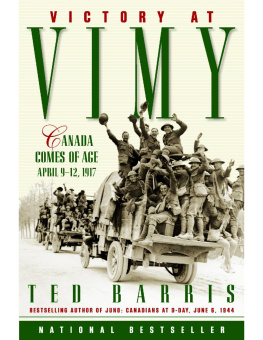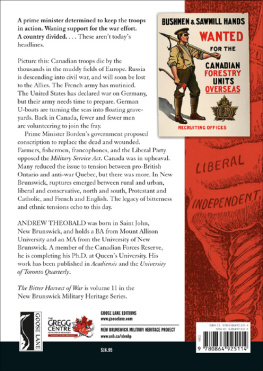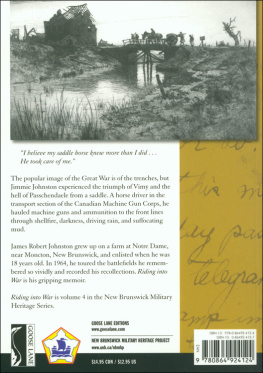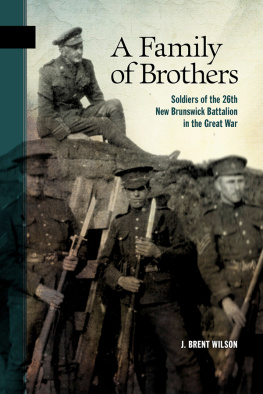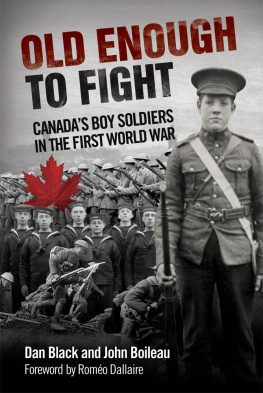Copyright 2018 John Cunningham
All rights reserved. No part of this publication may be reproduced or used or stored in any form or by any means graphic, electronic or mechanical, including photocopying or by any information storage or retrieval system without the prior written permission of the publisher. Any requests for photocopying, recording, taping or information storage and retrieval systems shall be directed in writing to the publisher or to Access Copyright, The Canadian Copyright Licensing Agency (www.AccessCopyright.ca). This also applies to classroom use.
Library and Archives Canada Cataloguing in Publication
Cunningham, John, 1939-, author
Where duty lies : a New Brunswick soldier in the trenches of World War I / John Cunningham.
Issued also in electronic formats.
ISBN 978-1-988286-31-0 (softcover).--ISBN 978-1-988286-32-7 (EPUB)
1. Grimmer, Frank. 2. Ypres, 3rd Battle of, Ieper, Belgium, 1917. 3. Soldiers--New Brunswick--Biography. 4. World War, 1914-1918--Canada. I. Title.
D542.Y72C86 2018 940.431092 C2018-900830-X
C2018-900831-8
Cover image: Library and Archives Canada PA-002165. Passchendaele Mud
Title page image: Frank Grimmer at Bexhill, England
Cover design: Gail LeBlanc
eBook: tikaebooks.com
Pottersfield Press gratefully acknowledges the financial support of the Government of Canada through the Canada Book Fund for our publishing activities. We also acknowledge the support of the Canada Council for the Arts and the Province of Nova Scotia which has assisted us to develop and promote our creative industries for the benefit of all Nova Scotians.
Pottersfield Press
248 Leslie Road
East Lawrencetown, Nova Scotia, Canada, B2Z 1T4
Website: www.PottersfieldPress.com
To order, phone 1-800-NIMBUS9 (1-800-646-2879) www.nimbus.ns.ca
Printed in Canada
Pottersfield Press is committed to preserving the environment and the appropriate harvesting of trees and has printed this book on Forest Stewardship Council certified paper.
An Aging Veteran of The Great War
The intermittent banging of a big, black make-and-break engine ricocheted through the mini-mountains surrounding Chamcook Lake, New Brunswick. It was the clamour of an old machine pumping water but it seemed to signal matters of great urgency. The cast-iron engine was started by turning a hand crank on a large flywheel and a broken arm was assured if you didnt move out of the way when the metal monster sprang to life. The engine had been started up thousands of times but, for some reason, today the pump had failed to drive water up to a big tank. There had been many turns of the crank, a lot of mechanical adjustments, an awful racket, and a lot of swearing.
Go to the barn and get me a Stillson wrench, Frank Grimmer shouted above the din. He was desperate that the order be carried out with dispatch. The engine noise continued to echo through the hills like thunder. Short of breath from the run to the barn and back and a frenzied search for the requested tool, the boy presented the plumbers instrument.
Thats not a Stillson wrench! Frank yelled, hurling it at a nearby tree with a force that peeled off a strip of bark before it hit the ground with a threatening thud audible above the snapping and sparking of the engine. Thats a goddamn monkey wrench! Goddamn fucking kid! Every job you do makes two jobs for someone else. Typical kid. Not worth the powder to blow them to hell.
In his youth, he had been a good ball player and was very much in control of the trajectory of the heavy iron wrench. Although red-faced and angry, he was not a man to allow his verbal abuse to boil over into the physical. The incident, while the engine assaulted the eardrums and disrupted an otherwise calm, hot, summer lakeside afternoon, was upsetting but not dangerous. The boy didnt feel threatened by the tirade, just disappointed that he had yet again failed to meet the expectations of a man he held in high esteem.
It was Franks adoring but long-suffering wife Dorothy who explained how these episodes of fury and frustration were more about his war experiences than life in the 1950s. He had returned from the Western Front thirty-five years before but was still tormented by nighttime visions of hordes of German soldiers, in their grey uniforms, swarming down to invade his home or cottage. Rifles with bayonets were stacked to the side of his fireplace mantel. They represented Franks wartime past as did the manuals in his officers field trunk stored in the barn. Those mouldy old hardcover books gave instructions on trench-digging and lessons on the grim realities of hand-to-hand combat.
Obscenity and insult were a sergeants way of drilling a platoon and Frank had learned a sergeants jargon well. No one doubted the veracity of his often-told tale of hurling an army boot at a drunk and disorderly soldier who refused to rise to the morning bugle call. At double their age, his bluster could intimidate the toughest young logger or labourer. Get your thumb out of your bum and your mind out of neutral, hed go so far as to instruct a fit young town works employee resting on his shovel. Youd make a good soldier, if your head were on backwards, hed inform anyone who tended to slouch. These outbursts were legendary in our town.
The seeds of Frank Grimmers frustration were likely sown long before the ghosts of battles drifted into his life. A lack of ability, interest, or application, or a combination of the three, resulted in mediocre school grades in a household where two older brothers and a sister were gifted students. Excellence was expected in the Grimmer family, which the leading provincial newspaper described as one of New Brunswicks most prominent. George Durell Grimmer, Franks father, ran a grocery and dry goods store, owned a tugboat company, and was president of a steamship line that provided regularly scheduled ferry service between the Bay of Fundy islands and the mainland.
Although he was not the wealthiest of Franks four uncles, it was Ward Chipman Hazen Grimmers name that resonated widely within the legal community, the voting public, the militia establishment, and the so-called whos who of New Brunswick society. A former New Brunswick attorney-general, with connections to Lord Beaverbrook and federal militia minister, Sam Hughes, he was appointed a judge in the days leading up to The Great War. The secret to successful living, he told fellow Supreme Court jurists, is work, service and attention to duty.
Not even the painful crack of his algebra teachers pointer could bring out the grammar school student in Frank. Consequently, he was sent to Mount Allison Academy in Sackville, New Brunswick, which could not produce records he even graduated from high school. Rough and tumble sports and student hijinks were the stuff of his boarding school tales. In fact, his apparently unrequited infatuation with the co-eds at the University of New Brunswick led to his expulsion within months of his enrollment there. Frank had a short unsuccessful term of engineering studies which ended a formal academic career that had been at best average. In the eyes of his family and the small community where gossip travelled widely and quickly, Frank had irresponsibly thrown away the chance of obtaining a university degree in an era when post-secondary education was an opportunity usually given to only the sons and daughters of the wealthy.


